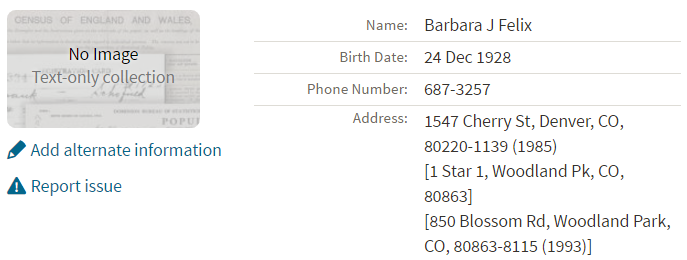Phenotyping and the future of Forensic Genetic Genealogy
Template not found:
Template not found:
The US Public Records Index can be useful for genealogy–if you understand what it is and how to use it properly. Here’s an example and some tips.
Not long Russ sent in this tip recommending the US Public Records Index for genealogy:
“I was listening to Genealogy Gems Podcast 181 [in which] you were talking about where do we search while we are waiting for the 1950 Census….I recently discovered a wonderful resource, on Ancestry.com, that I have used along with city directories. The name of the record group doesn’t sound interesting but it can be a Gem for you: the US Public Record Index, 1950-1993, Volume 1 and 2. Volume 1 is far more interesting with more data. A search will return a name AND birth date, along with more than one address, zip code and sometimes phone numbers.”
Here’s a sample search result:

Russ kindly sent me Ancestry’s description of its online database for Volume 1, which says that original data comes from public records spanning all 50 states, such as voter registration lists, public record filings, historical residential records and other household database listings.
Collection Profile
What: U.S. Public Records Index
Where: Ancestry, FamilySearch, MyHeritage
Years Spanned: 1950-2009
Source Type: Lacking original source citations. “Hints to go on and follow up with further research into verifiable sources.”
Then he shared the following example of using the US Public Records Index to find recent relatives that he can’t look up yet in the 1950 census:
“I had a hint for a cousin in a yearbook. I know that she recently lived in Philadelphia, Pennsylvania. I didn’t know where she went to college and I know her birthday. The name is not unique, not also not common. At the same time, I had the hint for the Public Record Index. You know those things we can’t use in a proof argument, but there [she] was in Philadelphia. The yearbook had her picture and only her name, not spelled the way I know it, but the Public Record Index puts her in Philadelphia at the right time and place.
I have seen 2 or 3 addresses for folks in the 1980s and 1990s in these indexes. Not all addresses have dates, but some do. I have one cousin with 5 addresses since 1983 and he won’t be in a census until the 1960 Census Records are released.”
Russ blogs about his family history at worthy2be.wordpress.com/. Thanks for the tip!
The U.S. Public Records Index pops up in my search results sometimes, too. Both volume 1 and volume 2 are searchable on Ancestry.com, as Russ says, in separate databases. Each has over 400,000 records in it. There’s also a free partial version of this database for 1970-2009 at FamilySearch.org and yet a third version at MyHeritage, with 816 million records, with nearly the same time frame. The FamilySearch database says its data comes from “telephone directories, property tax assessments, credit applications, and other records available to the public.”
Here are a few tips worth mentioning about the US Public Records Index. Some of these points come from the FamilySearch wiki:
 More Gems on Researching Recent Relatives
More Gems on Researching Recent Relatives
Press Release from the National Archives:
Barry Landau Sentenced to 7 Years for Thefts From National Archives, Other Institutions
Washington, DC . . . U.S. District Judge Catherine C. Blake yesterday sentenced Barry H. Landau to seven years in prison, and three years of supervised release, for conspiracy and theft of historical documents from cultural institutions in four states, including the Franklin D. Roosevelt Presidential Library in Hyde Park, New York.
The items stolen from the Roosevelt Library, which is part of the National Archives and Records Administration, were seven “reading copies” of speeches that Roosevelt delivered. They contained his edits and handwritten additions, along with his signature. They have all been recovered.
Landau’s co-conspirator, Jason Savedoff, will be sentenced at a later date.
Archivist of the United States David S. Ferriero said he was pleased that Judge Blake “recognized the seriousness of this crime and meted out an appropriate punishment that will serve as a warning to others who may contemplate stealing our nation’s history.”
“There is a very special bond that forms between researchers and research institutions. It’s kind of like an insider’s club. We speak the same language, share the same interests, explore the same minute details of historical knowledge that will eventually fill in the fabric of our shared history as a nation,” the Archivist added.
“When a researcher turns out to be a thief and steals the documents that are the very underpinnings of our democracy, our trust and respect for the community is shaken. Barry Landau is just that thief. Dressed in the guise of a scholar, he ingratiated himself with our staff and stole priceless documents from the Franklin Roosevelt Library. In essence he robbed from all of us—our collective history. And he did far worse damage to numerous other research institutions around the country.”
The Archivist said that because of incidents such as those involving Landau, the National Archives and other research institutions around the world have become more vigilant over the last few decades. They have instituted a number of measures aimed at preventing theft, such as closed-circuit cameras, clean research room rules, exit searches, and increased staff surveillance.
“When a theft does occur, we rely on the Office of the Inspector General and the Justice Department to build a case and bring the perpetrator to justice,” he added. “I want to thank them for their hard work.”
Lynn Bassanese, Acting Director of the Roosevelt Library, recalled that when Roosevelt dedicated his library on June 30, 1941, he declared it an “act of faith” in the American people.
“Barry Landau and Jason Savedoff violated that faith by taking advantage of the trust and confidence that the Roosevelt Library’s staff has for its researchers,” she said.”With the successful return of the stolen documents, the Roosevelt Library renews its commitment to protect and preserve the records of the Roosevelt Presidency and to make them accessible to the American people for generations to come.”
According to Landau’s plea agreement, the “reading copies” of Roosevelt’s speeches were stolen when he and Savedoff visited the Roosevelt Library on December 2, 2010.
“Reading copies” are the actual copies of the speeches from which the President read. They contain edits and handwritten additions made by him and bear his signature.
Four of these “reading copies” of speeches were sold by Landau on December 20, 2010, to a collector for $35,000. Three other “reading copies” of inaugural addresses delivered by Roosevelt, valued at more than $100,000 each, were recovered from Landau’s apartment in New York City during court-authorized searches, including the water-stained reading copy of the inaugural address Roosevelt delivered in a steady rain in 1937.
Judge Blake also ordered Landau to pay restitution totaling $46,525 to three dealers who purchased the stolen documents from Landau, not knowing they were stolen. She also ordered Landau to forfeit all the documents recovered during searches of his New York apartment.
The National Archives and Records Administration is an independent Federal agency that preserves and shares with the public records that trace the story of our nation, government, and the American people.